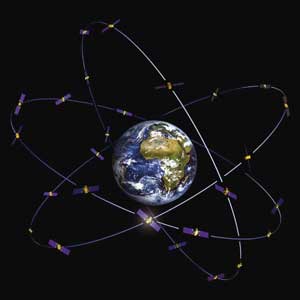|
NEWS NOTES — NEWS
Science and society
Galileo still up in the air
 ESA |
| Hampered by financial delays and infighting among its private investors, the European Union has decided to build its 30-satellite Galileo navigation system entirely with public funds. |
Despite persistent financial woes, the European Union’s (EU) troubled Galileo satellite navigation system is not yet dead. In June, transport ministers from the 27 EU member states conceded that only public money, rather than a combination of public and private funds, can save the multi-billion-dollar project. Whether the funds for the project will come from the member states or from EU coffers is still unknown.
Galileo, a proposed constellation of 30 satellites that would provide precise positioning information measurable down to less than a meter, was intended as Europe’s answer to the U.S. Global Positioning System (GPS) and Russia’s GLObal NAvigation Satellite System (GLONASS). The United States currently allows civilians around the world to freely use its GPS data, but the constellation of satellites that make up the GPS system is operated by the military. Supporters of the Galileo project have therefore argued that the European Union should have its own civilian-owned navigation system in place, in case the United States should choose to limit access to its data in times of war or political conflict.
Since its inception in 1999 as a public-private partnership between the European Union, the European Space Agency and a consortium of eight private companies, financial problems have plagued the project. The original plans called for the private consortium, which includes aerospace giant European Aeronautic Defense and Space Company (EADS), France’s Alcatel-Lucent, Britain’s Inmarsat and Italy’s Finmeccanica, to foot much of the bill for Galileo, including building the initial infrastructure. That bill was initially expected to total about $4.9 billion, with $1.6 billion coming from member states and $3.3 billion from private investors.
Squabbling among both EU states and private interests has delayed the project, however. To date, only one of the planned 30 satellites has been launched: In late 2005, the European Space Agency sent a test satellite into orbit. Additional satellites were intended to be launched from 2006 through 2010, with the system fully operational and under civilian control by 2010. Now, that date has been pushed back to 2012.
In March, the European Commission, the executive body of the European Union, set a May deadline for the consortium to adopt a common negotiating position, but the companies were unable to meet that deadline. On May 16, EU Transport Commissioner Jacques Barrot recommended that the European Union take control of the project away from the private consortium and pay for the project with public funds to get it moving forward again. “There have been delays, and there can be no more delays,” Barrot said.
At their June meeting, the 27 EU transport ministers agreed to fund the initial stages of the project entirely with public money, offering private interests the option to share operating costs in the future, but the ministers were unable to agree on how to pay for the shortfall. Some states are lobbying for the money to come from the European Union’s own coffers, while others argue that individual states should contribute additional funds to the European Space Agency’s budget to help pay for the project, thereby limiting the commission’s influence. The ministers will meet again in the fall to form a more concrete funding plan for the project.

 Subscribe
Subscribe


